Nangoli besides his finished products. Kikobero coffee is now exported to UK
Martin Nangoli, 47, was born in a poorly managed coffee garden and isolated family in Kikobero village, Masira Sub-county in present day Bulambuli district. He says his family and village were a laughing stock because his parents were hunters whose future looked murky. However, his background cannot define him today.
Like Nazareth, people questioned whether anything good could come out from Kikobero.
To succeed, Nangoli says he banked on Proverbs 22:29 that says “Do you see someone skilled in their work? They will serve before kings; they will not serve before officials of low rank.”
“My village was a dungeon. It was looked as a dark place for poor people,” Nangoli reveals in an exclusive interview with Business Focus.
Nangoli, now married with 4 children, joined secondary school four years after siting P.7. He says he started wearing shoes in S.2, thanks to a good Samaritan who donated a pair of shoes to him.
“A class mate girl donated me the shoes and that was fundamental. From a young age, I learnt that bullying people is evil, so I purposed that I would help people in my life,” he says.
As he struggled to attain education, Nangoli could never imagine that he would one day change not only his fortune but also that of his community and district at large.
Today, through his Kikobero Coffee Company Ltd, a company dealing in Arabica coffee growing, value addition and export, Nangoli is financially transforming people in his village, sub-county and district at large.
How Coffee Idea was birthed
Nangoli is a trained theologian from Alpha Omega Seminary, Jinja affiliated to the Global University based in US. He also did a theological course at Lifestyle Academy in the UK.
Equipped with training in theology and other disciplines including administration, Nangoli started working with various Christian based organizations.
He also started his own organization called Wake Up Ministries based in his home village, Kikobero.
While working with Oasis Trust, a UK Christian organization in 2002, Nangoli was given both Professionals and gap year students’ teams to work with on the programs he developed that included experience and teaching. The programs ranged from one week to 6 months.
“In 2004, the four students I took to Kikobero for an experience fell in love with every bite of the happenings in village, and got attached to it that they kept coming back until the time they left the country. When they were leaving, my mother gifted them with her kitchen made coffee,” Nangoli reveals.
He adds: “When I travelled to the UK in 2006, I was shocked that these people were still talking about how good the coffee my mother gave them was.” He says the connectivity of UK Churches with coffee was exciting.
It’s around this time that Nangoli developed the idea of preparing quality coffee for export specifically to sell to UK Churches.
“I saw people in UK drinking coffee before church service and after. These are people who don’t grow coffee but consume it highly,” he says, adding that when he came back, he met with village elders and church leaders and told them about the opportunity of exporting coffee to the UK.
He says although coffee is a tradition to Bagisu, at the time, the quality had gone bad. Working with various stakeholders, they started training farmers on how to grow, process and produce high quality Arabica coffee organically.
“Kikobero coffee was named after my village. Kibobero means let’s talk. Therefore, Kikobero coffee means let’s talk coffee. At the back of my mind, I wanted a cup of Kikobero coffee to dignify the farmer and unify the consumers,” Nangoli says.
He adds that since 2006, he has been travelling to the UK every year and has since been connected to several coffee stakeholders.
He says Kikobero Coffee Company (KCC) was legally registered in 2012. The same year, the Company took its first coffee samples of processed and graded coffee to the UK.
“It was tested in UK labs and they were surprised of the high quality of our coffee. Tasters also said that our coffee tasted good,” Nangoli, who also owns two primary schools with a population of 700 pupils, says.
Nangoli says it has taken him long to export coffee because big boys wanted him to give them his buyers/market and export the coffee as theirs, a thing he declined.
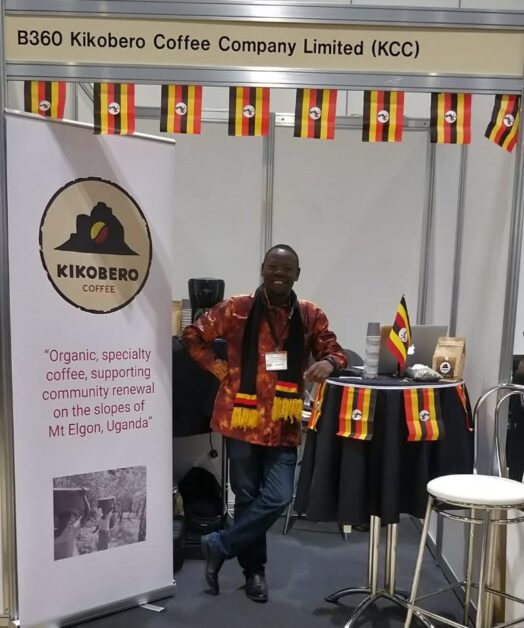
In 2013, he was introduced to Schluter, one of the big coffee companies in the UK. Schluter was founded in 1858. He says he sent them coffee samples and they liked the quality after several tests.
“In 2017, I personally met the CEO who liked our coffee. He asked me to prepare for them 4 tons of graded coffee (green),” he says, adding that the same CEO facilitated him to attend the Africa Fine Coffee Conference that took place in Kampala at Serena Hotel in 2018.
The breakthrough
“We delivered 3.72 tons to Schluter and this was a big milestone. It was the breaking of all the limitations,” he says, adding that in the same year, he also attended a coffee conference in London where he met many potential buyers.
“Some company after testing our coffee offered me 1m Pounds so that they take over the company and I work for them,” Nangoli reveals, adding that he out-rightly rejected the idea because his dream is to touch as many lives as possible in his community.
“My approach is bottom-up. I wasn’t necessarily looking for money. I want the farmer to be dignified by offering him a premium price,” he says, adding that many buyers and consumers don’t know how the man or woman who grows coffee lives.
UCDA Support
Nangoli says he has been looking for export license since 2015.
To get the license, he had to attain all the necessary documentation. He however says UK based Sunny Hill church has been buying Kikobero coffee since 2015.
He says he has worked closely with Uganda Coffee Development Authority (UCDA) headed by Dr Emmanuel Iyamulemye as Managing Director to see his dream coffee to fruition.
“UCDA is not as complicated as I was told before. The MD in particular has a fatherly heart. He has been so helpful and encouraging,” Nangoli says, adding that MARKUP Program funded by EU and implemented by Internal Trade Center (ITC) has also played a big role in training and exposing him to great resources, thus ensuring that he keeps up with standards for exporting value added coffee.
First Value Added Coffee Exported
Although Nangoli has occasionally exported coffee in green form/raw material, his first consignment of value added coffee touched down at Birmingham Airport, UK in early March 2021.
“This was a dream come true. That breaks the ice; the roof is now taken off. We can fly now,” Nangoli says with a beaming face.
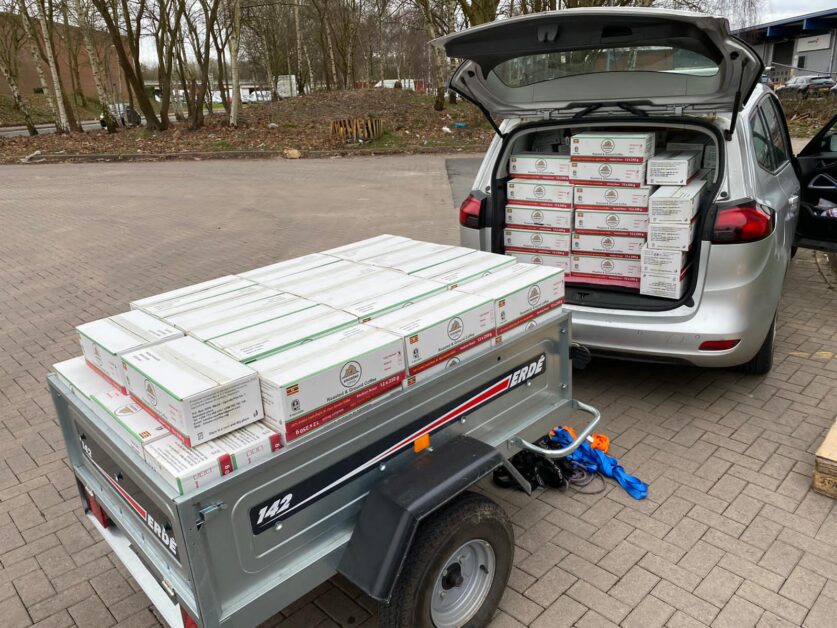
He adds that he has also exported finished products to South Africa and green beans to Germany.
“Their report indicated that that’s the best specialty coffee they have had,” he says.
Impacting Farmers
Nangoli says he’s working with 420 smallholder farmers who are well documented for traceability purposes.
“These are well trained to organically produce Arabica coffee,” Nangoli says, adding: “We pay our farmers a better price than any other buyer on the market.”
He adds that the company has a wet station for primary production in Kikobero village. They only source secondary processing equipment services in Mbale and then finished products at Kabanyoro Institute based CURAD (The Consortium for enhancing University Responsiveness to Agribusiness Development Limited) processing factory.
“We are always in charge of the primary processing. To maintain the cup quality, we control the process right from the garden. The farmer is always on my mind,” he says.
He says they (KCC) have been issued an audit invoice by ECOCERT, an Organic certifying body.
“We are waiting for the external auditors to directly audit our farmers and get Kikobero coffee certified as organic by an international body,” Nangoli says.
He adds that Kikobero Coffee is certified by Uganda National Bureau of Standards (UNBS), accredited by UCDA, approved Specialty by Specialty Coffee Association (SCA) and produced at CURAD.
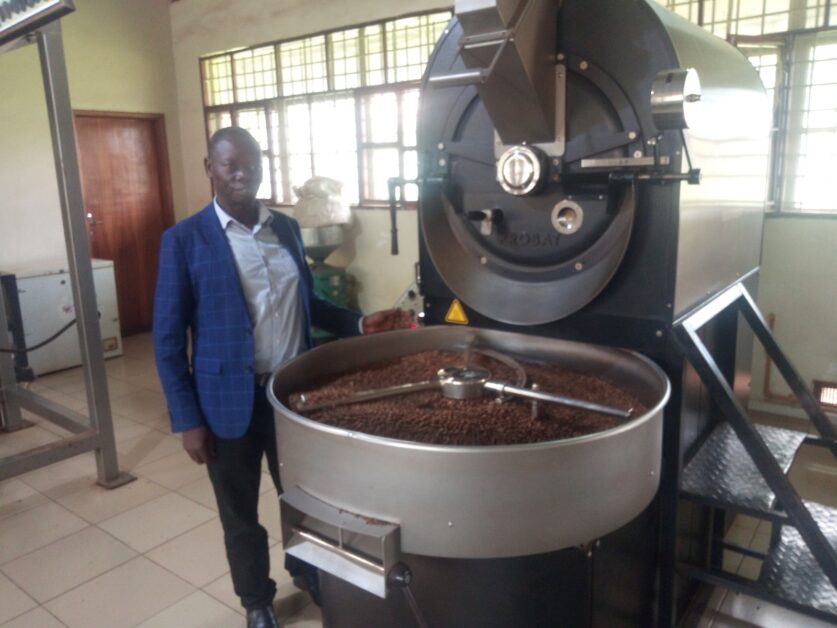
Asked whether he has capacity to buy all what his farmers produce, Nangoli said, “The farmers I have produce more than I can bite. The good news is we have set the pace, so they still sell the extra at a better price though they still miss out on the benefits we offer.”
He explains that God has given Uganda enough resources and if they are well managed, there’s enough for every person to live comfortably.
“We can use all our God given talents and professionalism to make the world better place for everyone,” he says.
Impacting Communities
He adds that his sub-county is now a role model in coffee farming that many farmers from other Sub-counties in the district visit it for learning purposes.
He says through his efforts, coffee quality in the entire district has improved. He adds that since he has schools, children are able to study on credit since he’s guaranteed that parents will pay him upon selling coffee.
He explained that each farmer on average has 500 coffee trees and each tree produces a minimum 10kgs per tree per-season.
“My sub-county that was the poorest is now a reference point,” he boasts, adding: “We are the best in terms of volumes and quality. We are impacting about 3000 households in the sub-county.”
He explains that the 420 farmers produce at least 2.1m kilograms of cherries. Nangoli, who has an order of 19 tons of green beans says, he needs 130,000 of cherries to produce it.
“To prepare one container, I will use Shs291m to process it and get it delivered. All this money goes back to my village. I have created employment,” he says, adding: “I will get Shs340m out of it, that’s minus taxes.
He says that because their coffee is specialty, it’s selling at the highest price.
To prove his point, Nangoli showed me invoices where a kilogram of green/graded coffee goes to as high as US$5 (about Shs18,000) at FOT (Free on Truck).
He says he has a system where he pays farmers who supplied him with coffee a bonus during the off season.
“This is key. I understand and value the farmer because I’m one myself. For each kilogram, I pay Shs100. This is my practice. They all know it and don’t need to remind me. For example, from 130,000 kilograms, I pay Shs13m in bonuses,” he says, adding: “This is the reason why I have so much influence in the community. People believe in me.” Nangoli employs 15 people directly while 85 are part-time employees. But besides coffee, he has created other 66 jobs in education sector.
Boosting Capacity
Nangoli says the company is now at take off stage.
“Working capital is the only limiting factor. I am looking for Shs1.9bn part of which will be invested in pre- primary processing. I want to have the best wet mill in Uganda,” he says, adding that he also wants Uganda Airlines to serve his coffee.
“In the UK, we are getting to the shelves,” he says. Asked how much he has invested the Company so far, Nangoli said he hasn’t made an evaluation but in infrastructure alone, he has spent about Shs450m.
Speciality Coffee
Asked He says that specialty coffee has a certain score.
“Speciality coffee begins at 80%. As Kikobero coffee, we have maintained the cup quality at over 80%,” he says, adding: “Kikobero coffee is 100% Arabica of single origin. Our unique aroma is set to represent Uganda coffee on world stage.”
He says that their coffee recently had 84.63% score, thus competing with Ethiopia that had 84.88% score last year.
Kenya and Uganda had 84.31% and 84.05% score respectively.
“This means our cup quality is higher than the national score. This is consistent with the feedback we regularly get from UK tasters,” he says.
Why focus on international market?
Nangoli says given the quality of their coffee and the processes it goes through, its price is relatively higher compared to other coffee brands.
“Many people here are used to cheaper things. Some don’t mind the quality. You go to a supermarket and they underestimate; they don’t want to listen to you,” he says, adding: “We took samples to the British High Commission in Uganda and before tasting our coffee, they wanted to buy because of packaging. Those are people who understand quality.”
He says his coffee brand will slowly penetrate the local market. At the moment, their coffee can be found at Uganda House Parking lot.
“Some people have arrogance of undermining ordinary people and local innovation,” he says, adding: “I control the production, so I can’t change the process. I have the trust of the buyers. This company is not ending after me.” Nangoli says 250gms of Kikobero coffee go for Ushs15,000, 100gms at Shs8,000 and 50gms at Shs5000.
“This is for corporate class because packaging is top notch, but we are working out away for the ordinary person to live up to bottom up approach,” he says.
Challenges
He says bad competition is one of the key challenges he’s facing but he is ready for it. He reveals that there are people who wanted to take over his farmers he has heavily invested into.
“They came and told farmers that I had lost buyers. There are people who think a black man cannot innovate and directly sell his products to international market,” he says.
He adds: “We are the best people to market our coffee. That way, most of the money will remain in Uganda. There are people who come to me saying we want to join you to improve on quality and I ask them how you improve something that is already better. We know what we are doing. I have traditional knowledge about coffee, acquired knowledge and experience. There’s no way you can beat me. I have an innovative team.” He says Uganda has a God-given resource that should be well utilized by Ugandans for the benefit of the country.
“As for me, I want to produce the best cup on the planet,” he says.
Processor Speaks Out
Kevin Mwesigwa, the Production Manager at CURAD, where Nangoli processes his coffee into a finished product, says Kikobero coffee is of high quality from the grind perspective.
“His coffee is always free from defects,” Mwesigwa says, adding that before going on to roast coffee, they also check for its moisture content which should be between 11-13%.
“When you roast and pack Kikobero coffee, it has a balanced profile,” he says, adding: “When roasted to medium, the acidity is still balancing and the body is still balancing.”
Do you want to share your success story? Contact: staddewo@gmail.com/0775170346




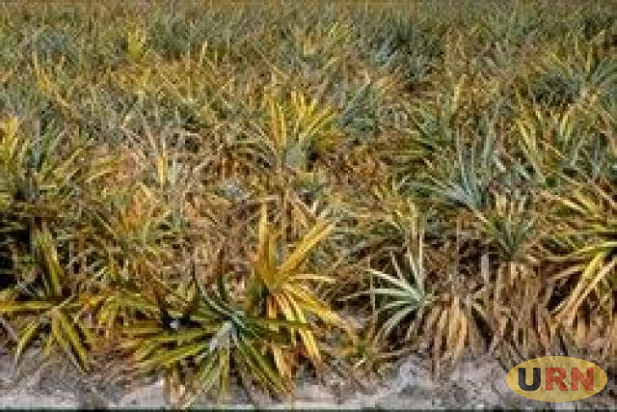
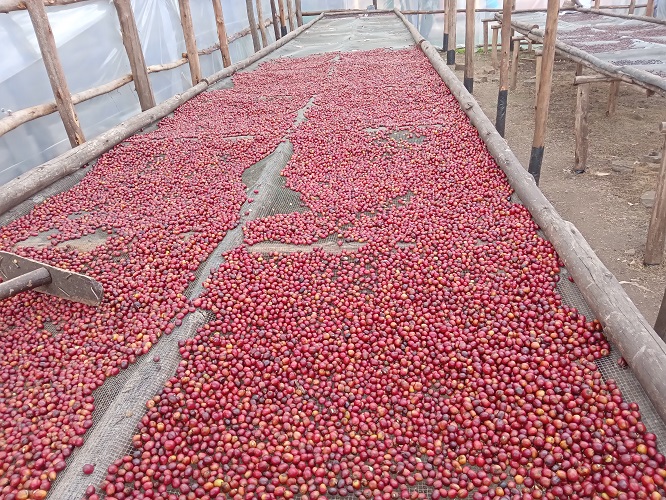
Truthfully Nangoli Martin is a great inspiration , I grew up looking up to his life. His life Challenges me to work harder.